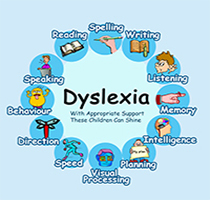About Dyslexia – What are the Signs And Symptoms of Dyslexia?

 July 27th, 2014
July 27th, 2014Download and Print PDF


About Dyslexia
What are the symptoms of Dyslexia?

- Difficulty learning to read despite normal intelligence, adequate teaching, and parental support.
- Family history of similar problems.
- Commoner in males.
- Childhood ‘milestones'(crawling, walking, speaking, throwing) are often delayed.
- Slow to learn to speak; poor at rhyming; mispronouncing words, lisps, not noticing small differences between word sounds.
- Slow at learning letters, letter sounds, alphabet, colours, days of week, months of year, multiplication tables.
- Poor coordination with unusual clumsiness.
- Difficulty with distinguishing left from right.
- Mis-sequencing letters, sounds, numbers, days of the week, months of year.
- Letter and number reversals.
- Letters appear to blur and move around and get in the wrong order.
- Bizarre spelling, same word spelt several different ways on the same page; spelling learnt one day forgotten the next.
- Difficulty with phonology (the sounds in words) is often claimed to be the most important feature, although these problems are found in any poor reader.
- Hatred of reading aloud.
- Difficulty copying from blackboard.
- Difficulty concentrating.
- Confusing left and right.
- Getting directions in the wrong order.
- Illogical sequencing of ideas.
- Immunological problems such as asthma, eczema, hay fever, other allergies.
- Dyslexia overlaps with related neuro-developmental conditions which tend to run in the same families, e.g. Dysphasia (Specific Language Impairment), Dyspraxia (Developmental Coordination Disorder), Dyscalculia, Dysgraphia, Attention-deficit hyperactivity disorder (ADHD), Asperger’s & Autism. The overlap with ADHD is around 30-50%, and with dyspraxia is even higher.
- NB often dyslexics have exceptional talent in other areas: the arts, engineering, business and computing.
Preschool

- Late in learning to talk, or with speaking clearly.
- Mispronounces familiar words; persistent “baby talk”.
- Doesn’t recognize rhyming patterns like cat, bat, rat.
- Trouble learning common nursery rhymes, such as “Jack and Jill”.
- Difficulty learning (and remembering) the names of letters in the alphabet.
- Unable to recognize letters in his/her own name.
- Family history of reading and/or spelling difficulties.
- Allergies, asthma, eczema, hay fever.
Childhood
- Particular difficulty with reading or spelling.
- Figures or letters, the wrong way round e.g. 15 for 51, 6 for 9, b for d, ‘was’ for ‘saw’.
- Confuses the order of letters in words.
- Reads a word then fails to recognise it further down the same page.
- Spells a word several different ways without recognising the correct version.
- Poor concentration span for reading and writing.
- Trouble with sounds in words, poor sense of rhyme.
- Difficulty pronouncing words, reversing or substituting parts of words.
- Doesn’t hear fine differences in words; e.g., writes “pin” for “pen”.
- Answers questions well orally but has great difficulty writing down the answer.
- Confuses left and right.
- Difficulty carrying out a sequence of directions.
- Difficulty understanding time and tense.
- Unusually clumsy.
- Has problems stating thoughts in an organized way.
- Allergies, asthma, eczema, hay fever.
Adulthood
- Bright in many ways but has a ‘block’ on reading and writing.
- Very slow and inaccurate reading, particularly out loud.
- Very bad spelling.
- Difficulty remembering what s/he has just read.
- Difficulty remembering telephone numbers.
- Difficulty concentrating when reading or writing.
- Unable to tell important information from unimportant details.
- Difficulty taking notes or copying.
- Difficulty with planning and writing essays, letters or reports.
- Difficulty carrying out three instructions in sequence.
- Allergies, asthma, eczema, hay fever.
The Dyslexia Research Trust
www.dyslexic.org.uk
The Sherrington Building,
Department of Physiology Anatomy and Genetics,
Parks Road,
Oxford OX1 3PT
Dyslexia Research Trust Clinics
Dr Anna Pitt (OXFORD Diagnostic Clinic)
Dr Sue Fowler (READING Visual Clinic)
Dyslexia Research Trust
179A Oxford Road
Reading
RG1 7UZ
0118 958 5950
Download and Print PDF









